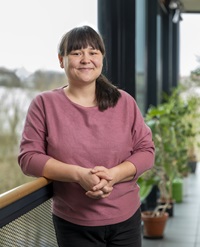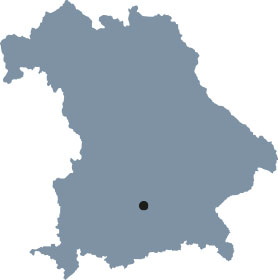Crop Synthetic Biology
New tools for a sustainable plant production - Continuous directed evolution to increase CO2 fixation and biomass in crops
Production of the major crops must increase at least 50% by 2050 to feed a growing world population. While classical breeding techniques may not achieve this goal, synthetic biology and metabolic engineering hold the potential to deliver new tools and technology to improve yield. We use directed evolution to engineer carbon availability in plants by increasing CO2 fixation and decreasing respiration.
| Place of research | Technical University of Munich: Campus Weihenstephan in Freising |
| Association | International Doctorate Program "The Proteomes that Feed the World" |
| Project duration | 2024 to 2030 |
| Group leader | Dr. Ulschan Bathe Contact the group leader |
| Further information | Website Crop Synthetic Biology |
Carbon limitation of crop-plants
Plants need carbon, nitrogen and other nutrients to grow. During evolution, they evolved under nutrient-limiting and carbon-surplus conditions because CO2 has always been available which they fix from the atmosphere. It is likely that evolution has not yet achieved optimal carbon fixation and usage because other nutrients (e.g. nitrogen) have been limited anyways. In modern agricultural practices, the surplus of carbon over other nutrients has turned to the opposite as plants are fertilized and irrigated in the field. Thus, modern crops are carbon-limited which restricts yield.
Directed evolution has proven to be a powerful tool to engineer proteins with desired functions. Thanks to mutation rates way above the natural mutation rate, we can condense evolution in a very short timeframe. We take advantage of that to engineer carbon availability in crops. How much carbon is vacant to produce biomass depends on the carbon fixation rate and on the rate with which plants consume carbon (=respiration).


The program offers an optimal environment to do research on real-life problems. Our projects are intended to provide new insights into carbon availability in plants and how to engineer it.
Dr. Ulschan Bathe
Therefore, we aim at supporting carbon uptake by establishing alternative CO2 fixation and by decreasing respiration rates. The ultimate goal is to create sustainable plants with increased biomass production.
Excellence and a supportive environment
The Junior Research Group provides the environment for doctoral students to work on innovative and state-of-the-art research projects in crop synthetic biology. We hire excellent people from all over the world, and encourage woman, minorities and researchers with children to apply.
Die Nachwuchsforschungsgruppe kooperiert mit dem Internationalen Doktorandenkolleg „The Proteomes that Feed the World“ auf dem Campus Weihenstephan der Technischen Universität München in Freising.


